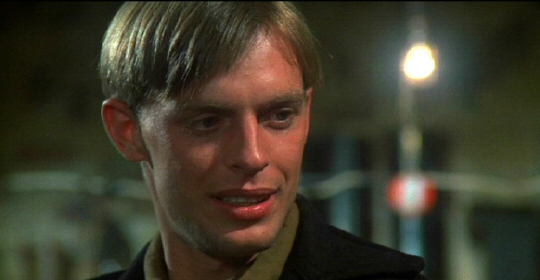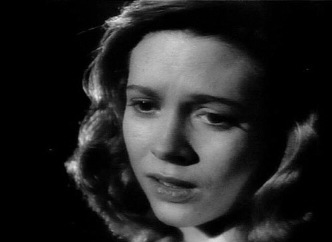
SECOND CHANCES
christopher funderburg
NICHOLAS RAY: Part III
page 3

Of course, there's something inherently unfair about comparing the two films. Altman's film is from an entirely different era and he delivered it as part of a virtually unparalleled artistic hot-streak during a time when the major studios were willing to offer him both significant financial backing and enormous creative freedom. Ray's film is more modest in every way and, for what it is, it is undoubtedly a quite lovely and memorable movie. The problem of comparison is compounded by the extreme similarities of the two films - watching them, I couldn't help by compare the different choices each director had made and the assorted small variations on everything from the change in breeds of the stray dog (a shaggy, black woolly thing in Ray versus a yellow lab in Altman's) to character traits (in Ray's film, Chicamaw has one eye; in Altman's film, he has three-toes). The two most significant differences in Ray's version are the absence of a major scene and the presence of another completely new sequence.
They Live by Night eliminates the extraordinary jail-break scene that punctuates Altman's movie, which caught me completely off guard. As a matter of fact, I spent most of They Live by Night in eager anticipation of that scene, excited to see how Ray would pull it off. Removing it undoubtedly stream-lines the movie and I imagine there were budgetary concerns as well - Ray's film was clearly made on the cheap and it seems believable that filming a complex action sequence on a prison farm might not have been financially feasible. Losing the prison break also seems to be the impetus for the sequence Ray's film has added - the alteration of the plot necessitates a new bit where the fleeing lovers take a bus ride and make the rash decision to get married at a little fly-by-night operation in the middle of nowhere. This original material is fantastic and easily the most memorable part of the movie - it again makes me regret that Altman's film exists; can just be coincidence that They Live by Night's most exhilarating, hilarious and tender moments all come in this one stretch that steps out of the darkness behind Altman's Thieves Like Us?
 But I also want to give credit where credit is due: Altman was almost certainly conscious of They Live by Night and Ray's film undeniably influenced the later work. Altman might be doing better work, but he's frequently elaborating what has already been laid out by Ray. For instance, Ray's film has minimal scoring (it might have none whatsoever, but I didn't think to notice until about halfway through the film) with the music for the soundtrack coming out of diegetic sources like a car and living room radio. Altman's film definitely only uses music from these same source, but he takes things one step further, supplying a soundtrack of not only period music but old detective serials, radio plays and political harangues. Shelly Duvall's portrayal of Keechie is eerily similar to Cathy O'Donnell's with the inflections and cadences of her line reading being reproduced in a way that's too identical to be coincidental - Duvall almost seems to be doing an impression of the other performance.* Ray's film mainly keeps the bank robberies off-screen, the crimes of the film barely represented in the world of the movie. Altman toys with this idea, incessantly keeping us outside the action until late in the film we're finally allowed a long look at what's going on inside.
But I also want to give credit where credit is due: Altman was almost certainly conscious of They Live by Night and Ray's film undeniably influenced the later work. Altman might be doing better work, but he's frequently elaborating what has already been laid out by Ray. For instance, Ray's film has minimal scoring (it might have none whatsoever, but I didn't think to notice until about halfway through the film) with the music for the soundtrack coming out of diegetic sources like a car and living room radio. Altman's film definitely only uses music from these same source, but he takes things one step further, supplying a soundtrack of not only period music but old detective serials, radio plays and political harangues. Shelly Duvall's portrayal of Keechie is eerily similar to Cathy O'Donnell's with the inflections and cadences of her line reading being reproduced in a way that's too identical to be coincidental - Duvall almost seems to be doing an impression of the other performance.* Ray's film mainly keeps the bank robberies off-screen, the crimes of the film barely represented in the world of the movie. Altman toys with this idea, incessantly keeping us outside the action until late in the film we're finally allowed a long look at what's going on inside.
As in Altman's film, Chicamaw makes for a great villain - a swirling ball of resentment, hardened criminality and offensive stereotypes about Native American alcoholism - and the movie really takes off in his few scenes as the heavy. His presence actually made me realize an interesting fact about Ray: his films rarely feature villains; the hero is almost always the antagonist as well. Dixon Steele's explosive temper provides the dramatic tension in In a Lonely Place. Knock on Any Door's Nick Romano keeps trying to go straight, but just can't get his shit together (because of the twisted society that produced him, man!). The schoolteacher's psychosis is the whole show in Bigger than Life: our hero's disintegrating mind is the only enemy. And, Chicamaw's two brief scenes aside, Bowie's internal conflicts over being a notorious fugitive but wanting to settle down with Keechie provide the real dramatic momentum of the film.
Chicamaw's forcefully menacing late-film appearances brought into relief just how infrequently Ray relies on true antagonists to drive his plot. You could even make the case that Joan Crawford's saloon owner inserts herself into the troubles of Johnny Guitar as much as she's drawn in: like Bogart in Casablanca, there wouldn't be a movie if her character quickly made the very feasible decision to sit things out - their internal vacilliation between involvment and apathy is an important dramatic force. They Live by Night is probably the most compelling variation on these internal dramatics - Bowie has literally no option that will actually pan out to his satisfaction and his desperate cycling through useless options is both harrowing and touching. When the wedding sleazebag refuses to "sell him hope where there ain't none," it's genuinely heart-breaking because you don't have any better ideas for what Bowie could do either - you want to sell him hope, but you can't in good conscience.
Also, here's one of those cosmic vagaries that really don't matter: Altman's film shares titles with the novel, while Ray's film picks a new name for the film. However, in Altman's film, the line explaining the title of the film is left out - used car salesmen are thieves, just like us; so says T-Dub (actually, it might be Chicamaw). That line is kept in Ray's film, meaning I didn't get the full context and meaning of the Altman film title until I saw the Ray version of the movie. I haven't read the book, so I don't know if it says anything about living by night.
* In particular, both women have a way of pronouncing "Bowie's" name in a thick drawl that makes it sound exactly like they are saying "boy."
(continued on page 4 of "Second Chances: Nicholas Ray: Part III")
<<Previous Page 1 2 3 4 Next Page>>
home about contact us featured writings years in review film productions
All rights reserved The Pink Smoke © 2009